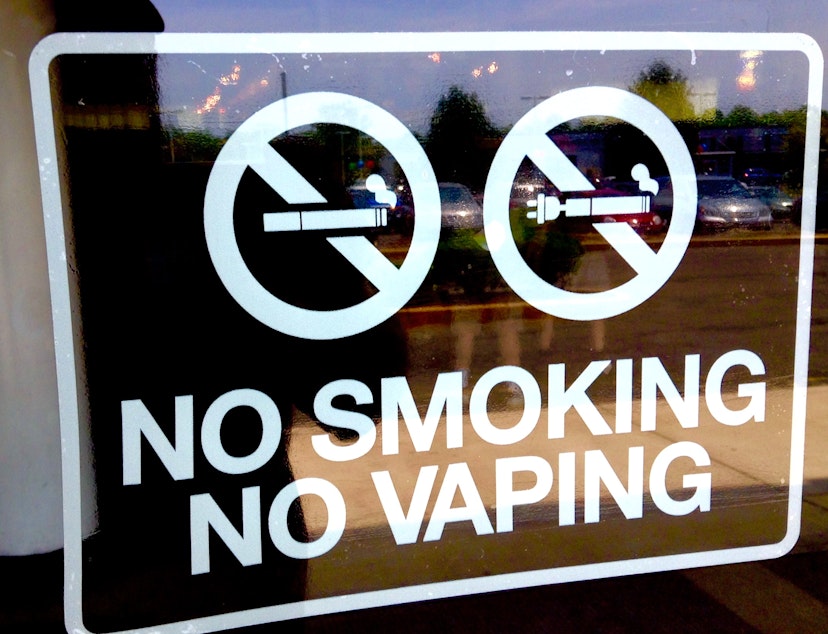Seattle experts say restrictions on vaping must go further

Seattle public health officials say more youth are vaping and regulators should consider banning all flavored nicotine “pods” or cartridges if they want to curb the growth.
Lisa Davidson manages substance use prevention for Seattle Public Schools. She said four years ago vaping rates appeared to be declining among students in King County, but then that trend reversed itself.
”With the invention of new, cooler, sleeker products we have heard anecdotally a rise from staff and students, as well as we’ve seen a rise in our disciplinary actions,” she said.
The new growth is attributed in large part to the popularity of the candy-flavored nicotine pods and the vaping device made by Juul Labs.
In the 2017-2018 school year, Davidson said, “90 percent of our tobacco and nicotine violations were for vapes. And over 60 percent of those were for Juuls specifically. So we are seeing some changes in the ways that youth are using nicotine.”
Davidson said health officials are trying to craft a response that will resonate in a way the anti-tobacco campaign has. But it’s tricky since some of the downsides of cigarettes aren’t a factor here.
“Young people say cigarettes are gross. They know that, right? They know they get bad breath, and that they smell and all those things. But then when we talk to them about vaping, they’re like, ‘but vaping gives me minty breath and it makes me smell like mangoes!’”
Sponsored
Facing potential new FDA regulations, Juul Labs announced it will voluntarily cease advertising on social media and potentially restrict the cartridge flavors in retail stores to tobacco, menthol and mint.
Davidson said pulling the advertising from social media likely won’t make a huge difference because Juul already has so much market share, and young people are ready to fill that gap.
“Peer promotion is a huge thing,” she said. “Young people taking videos of themselves vaping, or photos of themselves vaping and posting it.”
And the flavored cartridges Juul proposes keeping in stores are some of the most popular with underage users.
“The device is still very attractive to youth, menthol and mint are still available in stores, and they get it from their friends and they can buy it online,” Davidson said.
Scott Neal is the tobacco prevention program manager for Public Health Seattle & King County. He said the FDA should consider banning all flavors of vaping cartridges.
“I don’t think it’s rocket science: We know flavors attract kids,” he said.
Neal said considering that the FDA is also moving to ban menthol cigarettes and all flavored cigars, “there doesn’t seem to be any reason why we wouldn’t also consider that similar action for e-cigarettes, given the fact that we know e-cigarettes are used at higher levels among youth.”
Sponsored
He said he’s also skeptical of manufacturers dealing with underage use through voluntary measures rather than new federal regulations.
“I don’t think we would want to trust the tobacco industry to be taking prevention efforts as their focal point – same could be said about the vaping industry,” he said.
Along with the mint and mangoes, the pods contain what Davidson called a “staggering” amount of nicotine, the equivalent of a pack of cigarettes.
“Nicotine is harmful for the developing brain, and is something we do not want youth to be using at all,” Neal said.
He and Davidson said they’re concerned about nicotine addiction, toxic chemicals in vaping fluid, and evidence that users are more likely to smoke cigarettes later.
A 2016 surgeon general’s report warns that e-cigarette use is increasing at an alarming rate among young people. “E-cigarette use among youth and young adults is associated with the use of other tobacco products, including conventional cigarettes,” it says.
Sponsored
Davidson and school administrators are training teachers, librarians, chaperones and anyone who works with students to recognize the tiny cartridges and telltale scents of mango, mint and other flavors.
She said they also need to craft a message that will resonate with kids.
“We have heard mostly from kids that they are excited by it, they think it’s a healthier alternative, it’s not harmful, they can stop at any time. Those kinds of things are the general stories that we’re receiving at this point.”
While the New York Times recently chronicled one user’s struggle to quit Juuling, Davidson said those are isolated examples at this point.
“There have been a few young people who have come in and said, 'I don’t like the way it makes me feel anymore, I think about it too much, I have a hard time being home in the evening with my family without using it.'
"And that’s the beginning stages of being able to realize that they would like to eventually stop.”




